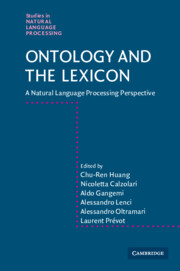Book contents
- Frontmatter
- Contents
- Contributors
- Preface
- Part I Fundamental aspects
- Part II Discovery and representation of conceptual systems
- Part III Interfacing ontologies and lexical resources
- 10 Interfacing ontologies and lexical resources
- 11 Sinica BOW (Bilingual Ontological WordNet): integration of bilingual WordNet and SUMO
- 12 Ontology-based semantic lexicons: mapping between terms and object descriptions
- 13 Merging global and specialized linguistic ontologies
- Part IV Learning and using ontological knowledge
- References
- Index
10 - Interfacing ontologies and lexical resources
from Part III - Interfacing ontologies and lexical resources
Published online by Cambridge University Press: 06 July 2010
- Frontmatter
- Contents
- Contributors
- Preface
- Part I Fundamental aspects
- Part II Discovery and representation of conceptual systems
- Part III Interfacing ontologies and lexical resources
- 10 Interfacing ontologies and lexical resources
- 11 Sinica BOW (Bilingual Ontological WordNet): integration of bilingual WordNet and SUMO
- 12 Ontology-based semantic lexicons: mapping between terms and object descriptions
- 13 Merging global and specialized linguistic ontologies
- Part IV Learning and using ontological knowledge
- References
- Index
Summary
Introduction
During the last few years, a number of studies aimed at interfacing ontologies and lexical resources have been done. This chapter aims to clarify the current picture of this domain. It compares ontologies built following different methodologies and analyses their combination with lexical resources. A point defended in this chapter is that different methodologies lead to very different characteristics for the resulting systems. We classify these methodologies and show how current projects, among which many contributions to this book figure, fit into this classification. We also present the tools available for facilitating the interfacing between ontologies and lexical resources.
In Section 10.2, we will introduce our methodology classification for combining ontologies and lexical resources, and in the next section, we will detail some of the most popular top-level ontologies, namely DOLCE, which has been introduced in Chapter 3, OpenCyc and SUMO (Niles and Pease, 2001), introduced in Chapter 2. These ontologies are all quite different from one another, although this might not be evident to the newcomer. Our purpose is to discuss the methodologies used to combine ontologies with lexical resources. In Section 10.4, based on the ground covered in the first two sections, we will show how actual initiatives fit into our classification. The lexical resources considered in the chapter are, for the most part, those of the WordNet family (Fellbaum, 1998) and are therefore good candidates for becoming linguistic ontologies.
- Type
- Chapter
- Information
- Ontology and the LexiconA Natural Language Processing Perspective, pp. 185 - 200Publisher: Cambridge University PressPrint publication year: 2010
- 2
- Cited by

